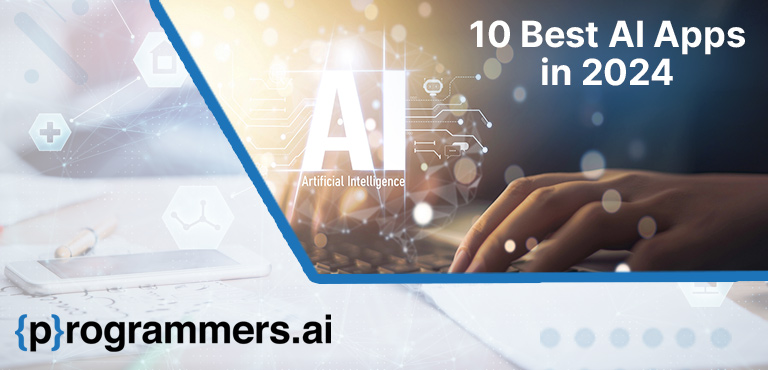About 91% of Americans own a smartphone, and an average person checks their phone 144 times a day. For people between the ages of 16 and 64, the average screen time is around six hours and 35 minutes. How this time is spent varies from age to age and even region to region. But it wouldn’t be a stretch to say that with AI apps, the average time is likely to increase. The best AI apps offer new ways of entertaining ourselves, new forms of interactions, and a range of new activities (both leisurely and productive). Let’s look into ten of the best AI apps you can use in 2024.
What are AI Apps?
An Artificial Intelligence (AI) app is a web or mobile application/software that is either built around or extensively uses one or more AI models to power its core services and functionalities. A more overarching definition is that any application that uses an AI model in any capacity is an AI app but that would be a massive number and most of these apps would merely have an AI functionality. So for this list, we will focus on apps that are built around or use AI extensively in their core functionality.
It’s important to understand that thanks to exuberant AI development cost, relatively few companies are building AI apps from scratch and training their own models. Many use some of the commercially available or open-source models and build an application over them. There is also a talent issue. The number of professionals with relevant levels and breadth of expertise in AI programming languages and AI development services is relatively small within the global developer community. We are in the initial stages of an AI boom, so some of the best AI apps, based on technical maturity, ease of use, etc., belong to a few specific categories. This includes Large Language Models (LLMs) and text-to-image generators. But we may soon see a healthy number of new AI apps from different domains coming online.
List of 10 Top AI Apps
The following list is created based on a few metrics, like the rating and number of reviews on different app stores. Most of the apps are available on all platforms (web, Android, Apple, etc.), but a few may be limited to mobile.
1. ChatGPT
ChatGPT remains unarguably the most famous AI application in the world. It wouldn’t be a stretch to call it the “Uber” of AI applications because it was one of the first tools that triggered the mainstream use of AI. Even though tools like Midjourney were released before it, ChatGPT facilitated more commonplace use of AI models and tools. It also established OpenAI as a prominent and well-known AI development company. With over 200 million weekly active users, it remains one of the most widely used AI apps in the world.
ChatGPT is basically an app built over an underlying Large Language Model (LLM) called GPT. The first model was GPT-3 and we are currently on GPT-4o (or Omni), which is the most powerful model right now. It’s trained on a massively large data set. A large learning model can be defined in a number of ways but the most basic definition is that it can read and write in human language.
The ChatGPT app can be used in a number of ways. You can interact with it, discuss ideas with it, use it for research, and ask it to produce a wide range of written content, from casual messages and official emails to blogs and e-books. It can also extract data from images, create charts, produce programming code (the more power models can even test and debug it), perform data analysis, search the web, and converse with you in a human tone. You can interact with it through text and voice. It can also create images, though it uses a different model created by the OpenAI company (DALL-E).
2. Microsoft Copilot
Microsoft Copilot also leverages the same basic AI model (GPT), thanks to the partnership between OpenAI and Microsoft. This is where most of its conversational capabilities come from (the LLM). However, it allows you to do a few more things, the most important of which is using AI directly with Microsoft Office products. It can directly draft or assist you in writing emails on Outlook, create slides from outlines in PowerPoint, help you with formulas and logic in Excel, and a number of other things. It can also create images from prompts, can work as an assistant, and can be prompted and respond in voice.
This makes it one of the best AI apps for people who use MS Office products for personal or work-related tasks. The app has a solid 4.8 rating on the Google Play Store and over 480,500 reviews. It is equally popular on Apple’s App Store.
3. Perplexity
Perplexity is another chat-oriented AI app with its own LLM called PPLX. There are different variants of these models, like PPLX-7b-Online. However, the Perplexity app (the pro version at least) may allow you to leverage other powerful models as well, like GPT-4o.
If I were to cite the most significant difference between Perplexity as an AI app and ChatGPT is that it’s more oriented towards accuracy. It will provide sources for the information and will strive to provide a precise answer. So it may not be as good at conversations as ChatGPT is, it might be a better choice if you are researching something. It has a solid rating on both Apple and Google app stores.
4. FaceApp
FaceApp is one of the most extensively used photo and video editor apps. It has over 5.1 million reviews in the Google Play Store, over 1.6 million reviews in Apple’s App Store, and, collectively, over a billion downloads. It allows users to put a wide range of filters on their photos and videos, including realistic age filtres and facial hairs (beard). Another common use of this app is put to is that it allows you to check different hair colors, styles, and other possibilities and visualize how these changes would look on your face before you commit to them. It can also be incredibly powerful for small touch-ups that people with no graphics designing knowledge and expertise can apply to their photos. The free version of the app is quite powerful.
5. Character AI
If you ever wonder what it’s like having a friend in your pocket, you may want to try Character AI. The basic premise is that you can create a character with whom you can chat. That character is powered by LLMs like GPT and others and leverages AI to emulate personality, talking style, and many other “human traits.” And it doesn’t have to be realistic. You can create fantasy characters as well. One overarching difference it has over other LLM-based apps like ChatGPT is that the characters have distinct personalities and the interactions seem deeper. Unlike ChatGPT alternatives like Google’s Gemini or Claude, this app is more about roleplaying and casual chatting than actually getting useful answers and research. The app has over 10 million downloads on Google’s Play Store and a 4.3 rating. The app is free to use.
6. Photoroom AI Photo Editor
Another AI-powered photo editing app is Photoroom. It’s geared more towards professional editing and has many of the classic tools like background remover, changer, AI backgrounds, effects like motion blur, etc. Many of the features are geared towards the background, which can be useful for converting average photos or a smaller set of photos into a larger set (for different contexts). It has free and multiple paid versions, but if you just want to have some fun, the free version is good enough. The app has excellent reviews online – 4.6 from 2.7 million reviews and over a hundred million downloads on Google Play Store.
7. Wysa: Anxiety, therapy chatbot
AI is revolutionizing many areas of life and business, which surprisingly include mental health, the most “human” of things. So, it’s not surprising that one of the best AI apps includes Wysa, a chatbot designed to help people with certain mental health issues like anxiety. It’s worth noting that Wysa isn’t purely an AI-based product, which is a good thing because AI helping humans with mental health is cutting-edge right now. The app is developed and maintained with the help of psychologists who monitor AI’s responses to different mental health discussions with the users. It also relies upon extensive scientific literature on relevant topics like cognitive-behavioral techniques. It’s available for both individual users and businesses. The best part about an app like this is people are more likely to open up to an AI than humans, and it may encourage many people who would otherwise shun help to avoid any stigma or judgment to seek the mental health-related help they might need. The app has both free and paid versions. The app has solid ratings – 4.7 on the Play Store and 4.9 on the App Store but not as many reviews as some other apps on this list.
8. ELSA Speak
ELSA Speak is a powerful, AI-powered learning app that can help people learn to speak English. The app describes itself as a personalized AI English coach. It has been quite successful, has over 10 million downloads of Google Play Store, and has a 4.5 rating with over 900,000 reviews. It also has a rating of 4.8 based on over 100,000 reviews on Apple’s App Store. The app is free (but there is premium content) and quite thorough. It guides users on exact pronunciation and enunciation and ranks them so the user has a good idea of how they are progressing. There is an adequate amount of content so the user learns without getting bored.
9. Cleo AI
To many people from the older generations, the idea of using AI for financial advice and personal financial management may seem a little risky, but Gen Z is all for using AI in this area of life as well. Cleo AI is one of the best AI apps for personal financial management and offers a powerful list of features. It’s an AI financial coach with healthy ratings on Google’s Play Store and Apple’s App Store. It has been downloaded over five million times (as per the company) and helps users with things like budgeting, improving their credit score, and saving. One of the best parts about the app is its personality. It even employs humor and aggressive conversational techniques to “berate” users for poor financial habits.
10. Ada – Check Your Health
Closing the list is another health-related app, though Ada is more about your physical health than your mental health. It wouldn’t be right to call it the AI version of WebMD, but the app does help you run your symptoms by it and try to understand the health problems you might have. The app was supposedly built by medical professionals, and it’s certainly maintained by them, as the team has over 50 medical professionals on board. The app basically gives you a medical by asking about your symptoms, medical history, and several other questions, then prepares a report for you. It has about 14 million users and excellent ratings.
Benefits of using AI Apps
The benefits of using AI apps differ based on the kind of app you are using, but some common benefits include:
- Better productivity: Regardless of whether you are an individual or business or are using the app in a personal or professional capacity, AI apps can make you more productive. They can streamline tasks and take care of much of the leg-work.
- Improved Communications: You can leverage AI to at least improve your written communication and can work with AI teachers and communication apps to improve verbal communication as well.
- Learning Opportunities: One of the most significant aspects of using some of the best AI apps (especially the LLMs) is that you can learn almost anything at your own pace. These apps can break down complex concepts for you and make them as simple as you want. They can also help you learn and absorb knowledge and ideas using analogies and examples that you might relate to. Most importantly, they can help you learn at any pace you are comfortable with. AI models don’t get frustrated and judgmental, and they may not have the humanity of real teachers, but they can certainly mimic some of their best traits.
- Expanded Area of Expertise: AI apps can help you go beyond your area of expertise. Photo editing apps can help you achieve desired results even if you have no formal training with conventional tools. Image generators can help you create art even if you have no artistic practice. You can use advanced Excel formulas and even do a bit of coding with the help of the right AI apps.
There are several other benefits as well, like mental health assistance, physical health tracking, financial tracking, etc., that are relevant to specific AI app types. They can also expand your leisure/fun domain and add new dimensions to it.
Characteristics of Best AI Apps for Your Business
Choosing the best AI app can be challenging, regardless of whether you are an individual or a business, even if you have a clear understanding of the goals you want to achieve with that app. But a few characteristics that you need to look into and can help you make the right decision are:
- They are simple enough to use. If there is a huge learning curve, you might as well look into conventional tools.
- They offer tangible benefits like cutting down your research or production time by a considerable margin.
- They are accurate enough for your use case. AI apps may be the best research assistants in most cases, but in some niches, obscure topics, or highly specialized areas of expertise, they may not be able to provide accurate information. That’s where the best AI apps will let you know about their limitations, and the bad ones will just respond in gibberish.
- They are cost-effective.
- They can help you enhance your existing skill set (the collective skill set of your team) and expand upon it in relevant dimensions.
Conclusion
There are a lot of AI apps available on different platforms, each with its own use case, strengths, and weaknesses. The more mature dimensions of these apps, like LLMs, can be compared on shared benchmarks, while others may be judged on their reviews and ratings. The best AI apps for you are the ones that can let you do what you want to do more effectively and efficiently and without significantly adding to the cost and effort.






